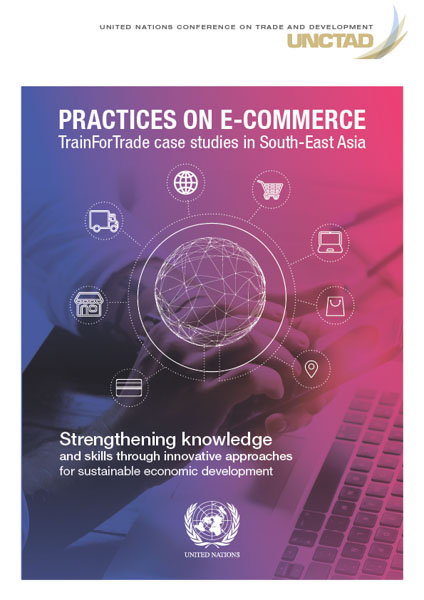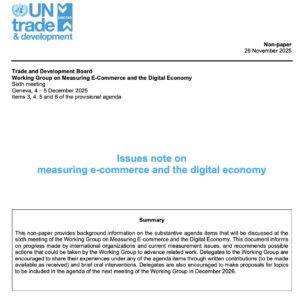Practices on e-commerce: TRAINFORTRADE case studies in South-East Asia

Digital marketplaces could drive sustainable and inclusive growth across South-East Asia, with e-commerce likely to grow to US$88 billion by 2025. Benefits will include opening of markets to facilitate sales and consumption, upgrading of traditional manufacturing and services, and development of new industries for business opportunities.
While some countries have made significant inroads into e-commerce, the majority of developing countries are still trailing behind due to two categories of challenges. First, developing countries need to tackle obstacles to e-commerce, such as lack of access to information and communications technology (ICT) infrastructure, shortage of skills, and weak legal frameworks. Second, the current market concentration and competition frameworks are skewed against latecomers and smaller players, in particular those from less developed countries.
Against this backdrop, UNCTAD has over the past two decades focused its work on the development implications of e-commerce and digitalization. UNCTAD provides leading-edge research and analysis, technical cooperation, and global platforms for multi-stakeholder policy dialogues in a holistic and integrated approach. It publishes flagship reports on digital economy (the Digital Economy Report), coordinates the multi-agency eTrade for all initiative, conducts eTrade readiness assessment, and convenes the influential multi-stakeholder
E-commerce Week.
As part of its holistic methodology, UNCTAD underscores the importance of mutual learning between countries and at regional levels in the areas of e-commerce and digital economy. In this context, the UNCTAD TrainForTrade programme launched a project in 2018 on “Leapfrogging skills development in e-commerce in South-East Asia in the Framework of the 2030 Development Agenda” under the United Nations eleventh tranche of the Development Account. Two hundred and sixty candidates from the public and private sectors from South-East Asia have successfully participated in this training project that encompasses six in-depth online training modules on e-commerce and e-business fundamentals, e-government, payment, transportation and logistics, digital marketing, and marketplaces, as well as a face-to-face workshop in the region.
It is hoped that the project’s goal of sharing experiences, knowledge and expertise among participants and delegates has been achieved. This report explores in its first chapter a history of the project. The second chapter gives an overview of the e-commerce situation in the region. The third chapter presents the selection of eight case studies prepared by the project’s participants, covering e-government, e-payment, transportation and logistics, marketplaces and digital marketing. These case studies provide succinct examples of good practices as well as policy recommendations for further development of e-commerce. The fourth chapter concludes the publication with a list of recommendations.
Participants in this project highlighted that the classic policy issues are still to be addressed.
The first approach identified to address these issues is to consistently and strategically invest in physical infrastructures, from roads and railways, to waterways and air transportation, in particular in remote and less-developed regions. The second is to increase the ease of doing business by cutting red tape, reducing unnecessary taxes and fees, and providing more support to empower micro, small and medium-sized enterprises (MSMEs). The third is to level the playing field between big and small companies, through more transparent government procurement policies, and more robust antitrust policies to allow more competitors in the markets.





